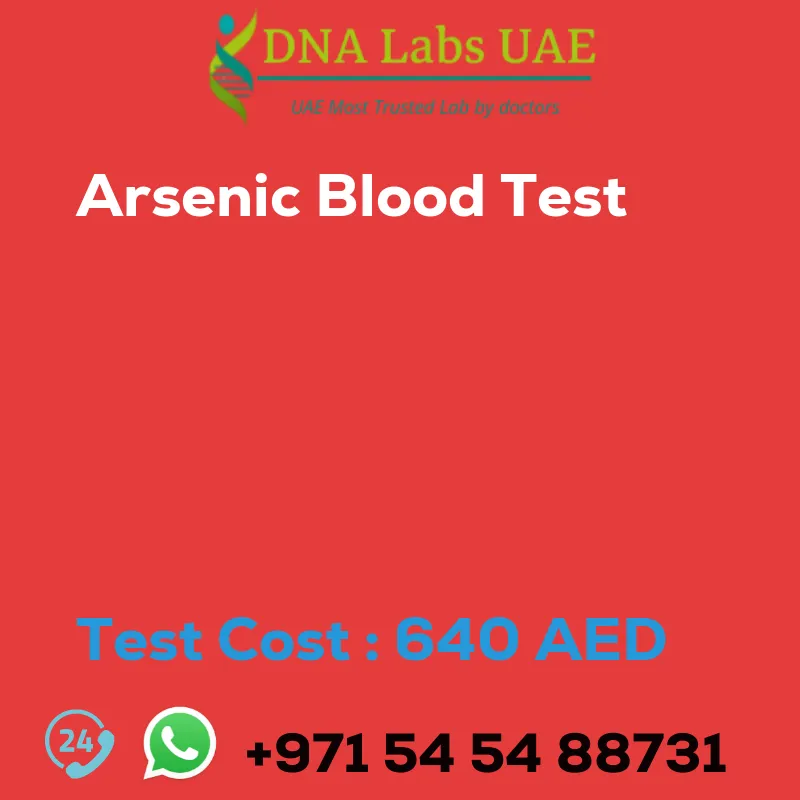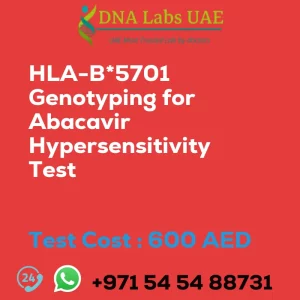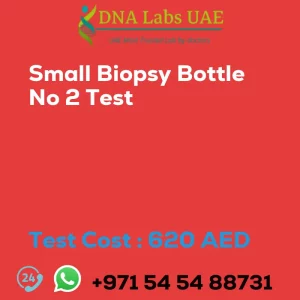ARSENIC BLOOD Test Cost AED: 640.0 – Symptoms, Diagnosis, and More
At DNA Labs UAE, we offer the ARSENIC BLOOD test at a cost of AED 640.0. This test helps measure the levels of arsenic in a person’s blood. Arsenic is a toxic heavy metal that can be found in contaminated water, food, or through occupational exposure.
Test Name: ARSENIC BLOOD Test
Components: Arsenic Blood Test
Price: 640.0 AED
Sample Condition: 4 mL (2 mL min.) whole blood in 1 metal free Royal Blue Top (K2EDTA) tube available from LPL. Ship refrigerated. DO NOT FREEZE. Patient should avoid eating sea food and herbal supplements for 3 days prior to sample collection. Use powderless gloves during specimen collection.
Report Delivery: Sample daily by 6 pm; Report next day
Method: ICPMS (Inductively Coupled Plasma-Mass Spectrometry)
Test Type: Industrial Diseases, Poisoning
Doctor: Physician
Test Department: ATOMIC ABSORPTION
Pre Test Information: Patient should avoid eating sea food and herbal supplements for 3 days prior to sample collection. If Gadolinium or Iodine containing contrast media has been administered, the specimen should not be collected for 96 hours.
Test Details
An arsenic blood test is a medical test that measures the levels of arsenic in a person’s blood. This test is typically performed to evaluate suspected arsenic poisoning or monitor occupational exposure to the metal.
During the test, a healthcare professional will draw a blood sample from a vein in the arm. The sample is then sent to a laboratory for analysis. The laboratory will use various methods, such as atomic absorption spectrometry or inductively coupled plasma-mass spectrometry, to measure the amount of arsenic in the blood.
The results of the test can help healthcare providers diagnose arsenic poisoning or assess the level of exposure to the metal. Normal levels of arsenic in the blood are typically less than 10 micrograms per liter (g/L). Elevated levels may indicate poisoning or excessive exposure.
If arsenic poisoning is suspected, additional tests may be performed to confirm the diagnosis and determine the source of exposure. Treatment for arsenic poisoning may involve removing the source of exposure, supportive care, and specific antidotes if necessary.
It is important to note that the interpretation of the results should be done by a healthcare professional familiar with the individual’s medical history and specific circumstances.
| Test Name | ARSENIC BLOOD Test |
|---|---|
| Components | |
| Price | 640.0 AED |
| Sample Condition | 4 mL (2 mL min.) whole blood in 1 metal free Royal Blue Top (K2EDTA) tube available from LPL. Ship refrigerated. DO NOT FREEZE. Patient should avoideating sea food and herbal supplements for 3 days prior to sample collection. Use powderless gloves during specimen collection. |
| Report Delivery | Sample Daily by 6 pm; Report Next day |
| Method | ICPMS |
| Test type | Industrial diseases, Poisoning |
| Doctor | Physician |
| Test Department: | ATOMIC ABSORPTION |
| Pre Test Information | Patient should avoideating sea food and herbal supplements for 3 days prior to sample collection.If Gadolinium or Iodine containing contrast media has been administered, the specimen should not be collected for 96 hours. |
| Test Details |
An arsenic blood test is a medical test that measures the levels of arsenic in a person’s blood. Arsenic is a toxic heavy metal that can be found in various sources, such as contaminated water, food, or occupational exposure. The test is typically performed to evaluate suspected arsenic poisoning or monitor occupational exposure to the metal. During the test, a healthcare professional will draw a blood sample from a vein in the arm. The sample is then sent to a laboratory for analysis. The laboratory will use various methods, such as atomic absorption spectrometry or inductively coupled plasma-mass spectrometry, to measure the amount of arsenic in the blood. The results of the test can help healthcare providers diagnose arsenic poisoning or assess the level of exposure to the metal. Normal levels of arsenic in the blood are typically less than 10 micrograms per liter (g/L). Elevated levels may indicate poisoning or excessive exposure. If arsenic poisoning is suspected, additional tests may be performed to confirm the diagnosis and determine the source of exposure. Treatment for arsenic poisoning may involve removing the source of exposure, supportive care, and specific antidotes if necessary. It is important to note that the interpretation of the results should be done by a healthcare professional familiar with the individual’s medical history and specific circumstances. |








